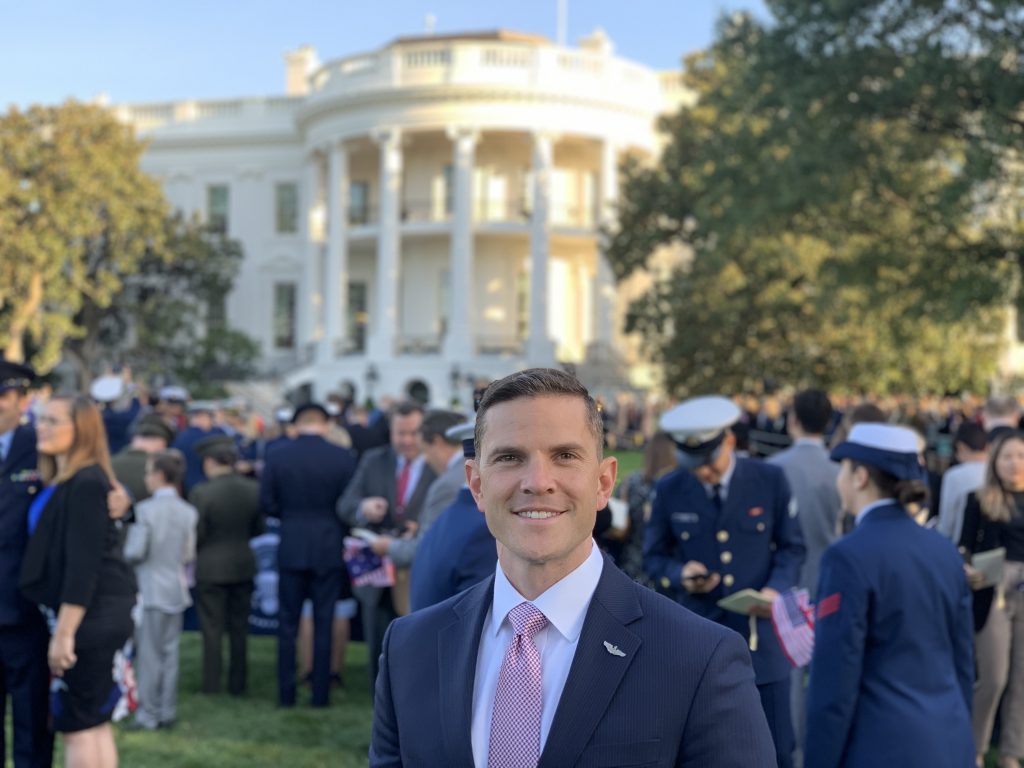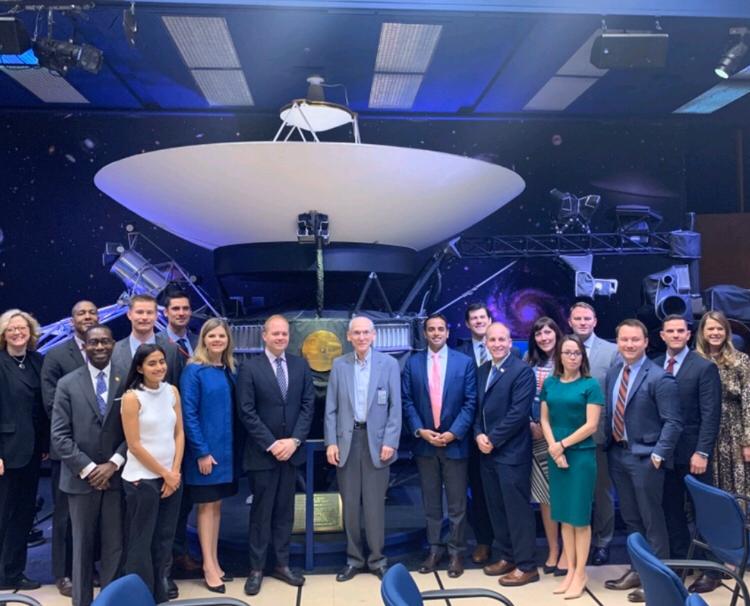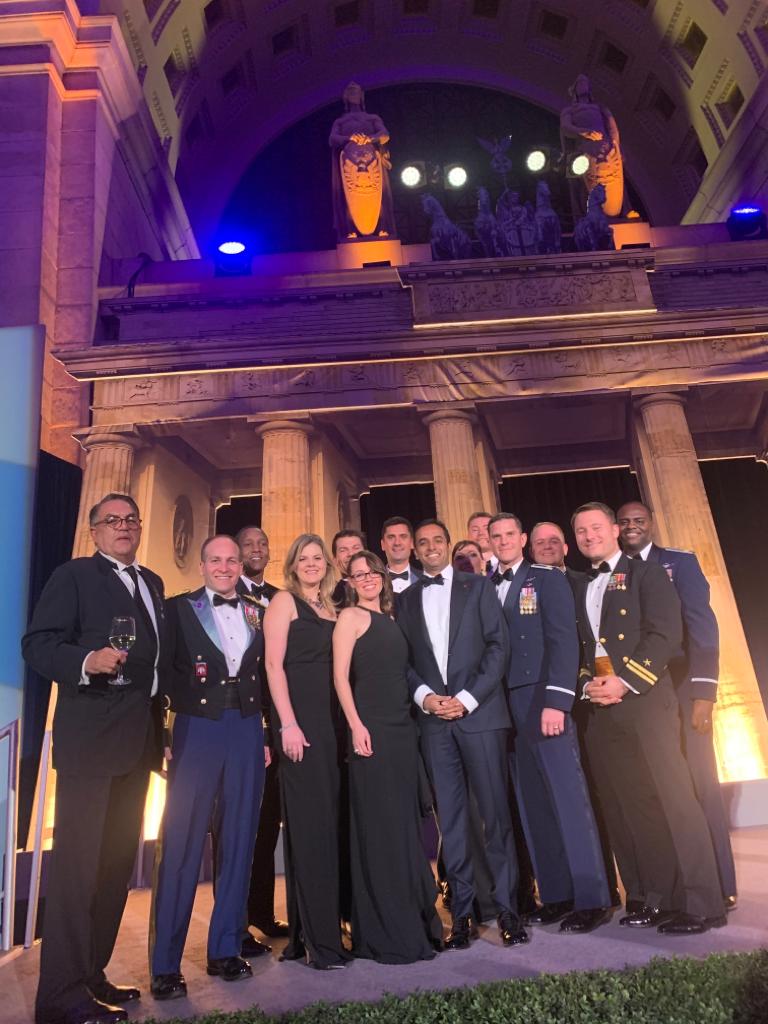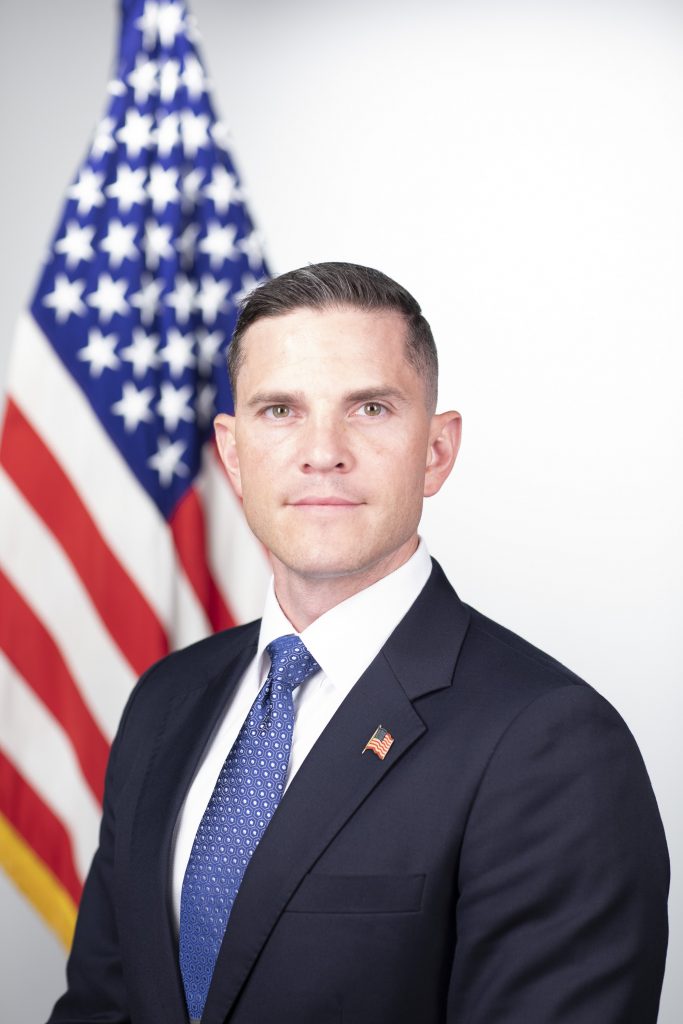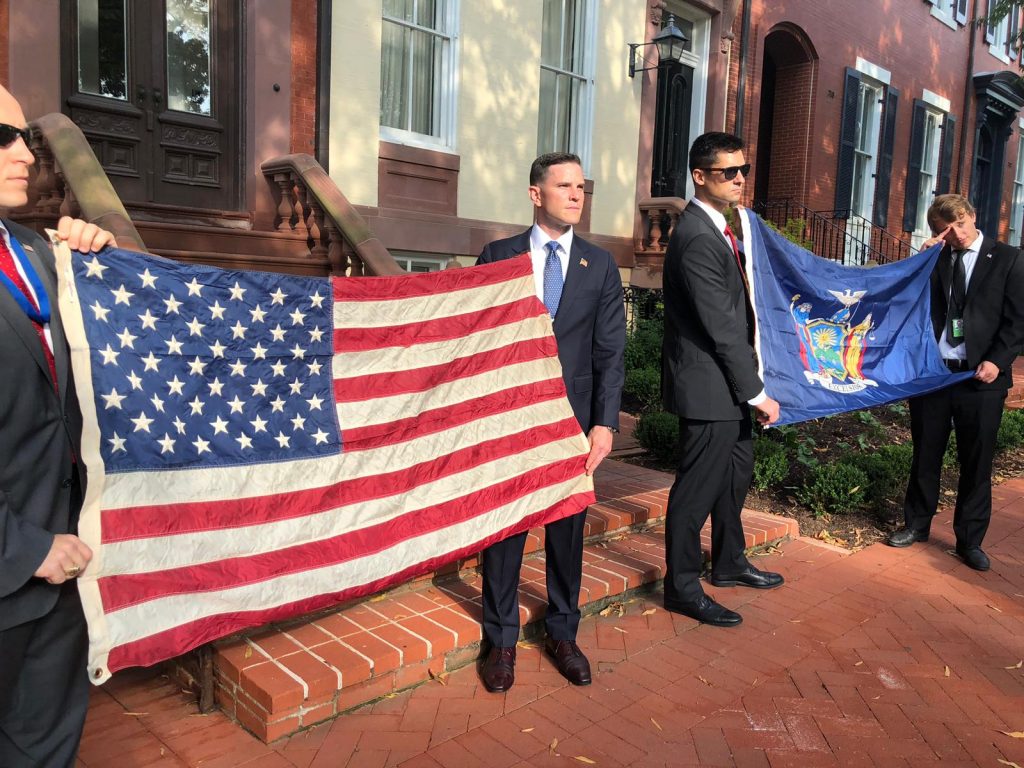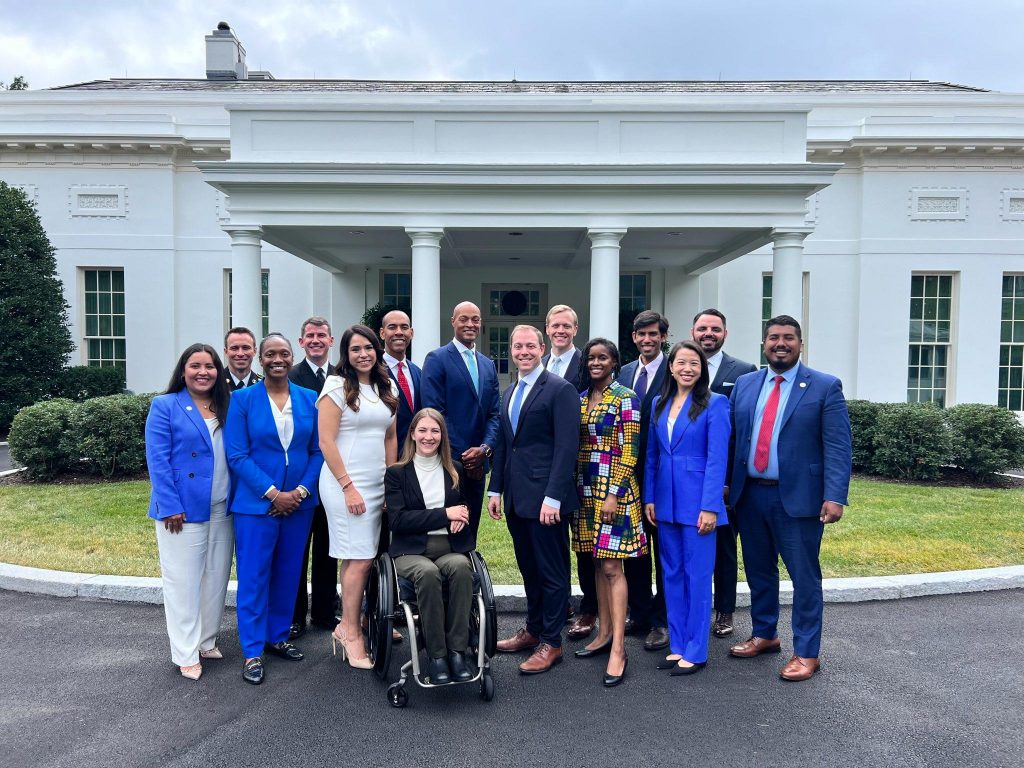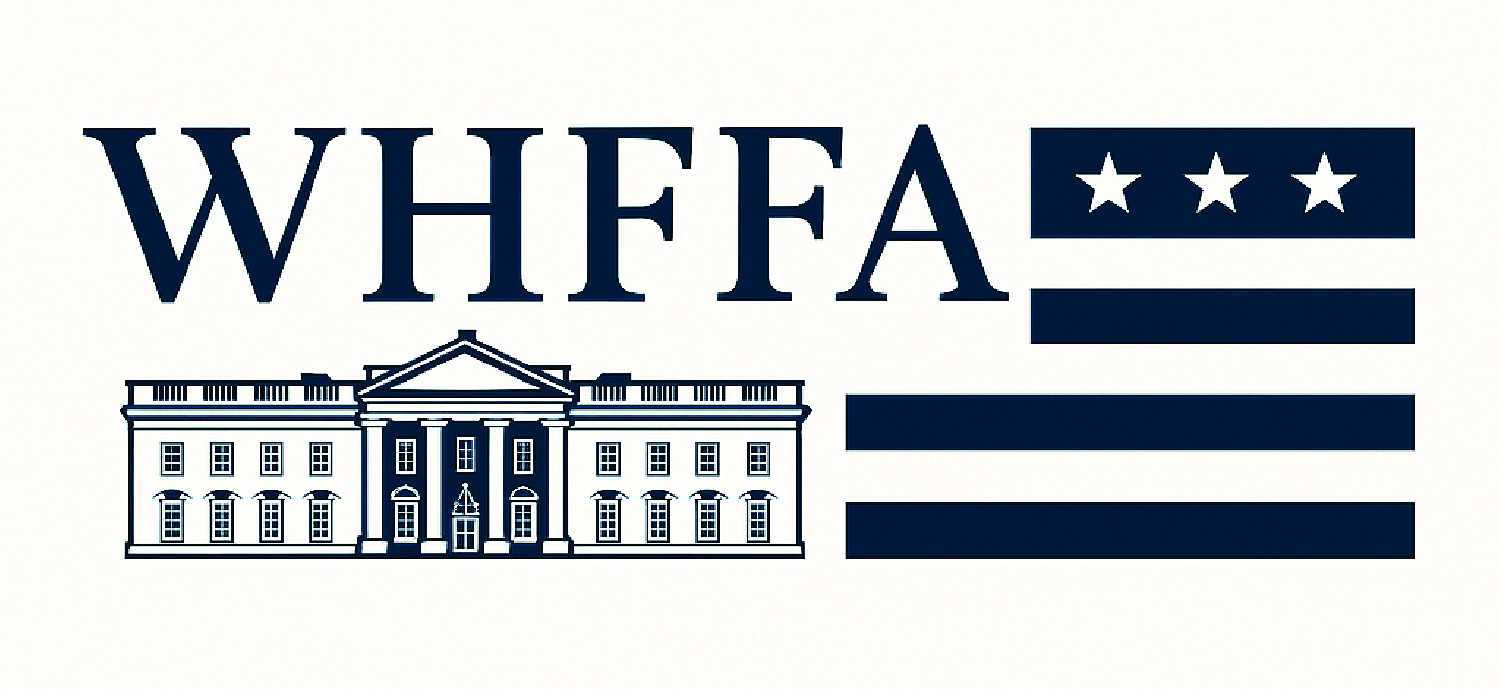WHF Profile: Brandon Dues (2019-20)
Can you tell us about yourself and your work before the White House Fellowship?
I served as a military pilot and career Air Commando within Air Force Special Operations Command flying the U-28A “Draco” for counterterrorism combat missions, completing several deployments to Afghanistan, the Horn of Africa, and Iraq. Coupled with a public policy educational background, I also served at the North Atlantic Treaty Organization headquarters providing unfettered military advice to the North Atlantic Council for several years.
How did you hear about the White House Fellows Program and what made you decide to apply?
I first learned of the White House Fellowship via a U.S. Air Force mass announcement e-mail at 2 a.m. after completing a nighttime flying sortie and I immediately knew I wanted to apply. With a personal interest in public policy linked with a desire for long-term service to our nation, the decision to apply was easy as I hoped to learn more about other instruments of national power beyond the military capability I continue to serve.
What goals were you hoping to achieve through the Fellows program?
Having spent the majority of my military career focused on counterterrorism, my aims were three-fold. First, I hoped to learn how U.S. economic policy and initiatives were interconnected, complemented, and limited/expanded military initiatives. Seeking a more complete understanding of the other instruments of national power, my aim was to derive a full understanding of the key linkages between them via an immersion in economic policy. Second, I sought a complete, practical understanding of how our democratic and civic institutions coordinated and executed law and policy at the highest levels. Finally, I wanted to better understand leadership and how executives lead at the organization and strategic levels.
Where were you placed and what was the focus of your work?
The Fellowship offers a unique experience with a limited time under differing circumstances and I was blessed to serve at the Export-Import Bank of the United States, an independent governmental agency, working on a variety of topics from Congressional engagement to recertify the Bank’s charter, national security reviews and context for the Bank through work at the National Security Council, building an emerging team for 5G cellular deals, and even establishing a $27 billion fund to incentivize American business and innovation in ten transformational economic sectors including artificial intelligence and quantum computing. I received incredible mentorship from a variety of people across the Fellowship and at EXIM, showcasing the numerous U.S. economic capabilities and had exposure and access to many meetings and engagements not otherwise routinely available.
How did the trajectory of your life and work change after the White House Fellowship?
I’ll echo the late GEN Colin Powell’s Fellowship experience in stating that the Fellowship fundamentally changed the trajectory of my life as it altered the paradigm and lens from which I viewed the world. Instead of a parochial and exceptionalism-type view many might naturally adopt due to the passion and effect of their specific work, the Fellowship showed me a wide world of civil servants and governmental capabilities that all contribute and complement each other to contribute to national security. The Fellowship also helped develop and hone leadership and cooperative skills to build effective teams from wildly different backgrounds, including ones completely unfamiliar to me, and skillsets toward a unifying policy goal. Those aspects fundamentally adjusted how I approached further work within the military, how I mentored others, and how I approached problem solving.
Can you tell us about peers and mentors who helped you on this path?
Anyone who succeeds does not accomplish those deeds alone. I encourage anyone interested in the Fellowship to proactively seek out mentors and peers who encourage you and challenge your thinking and approach. Like the crafting of a katana sword which requires multiple folds of the metal to make it extremely sharp, you must craft, reexamine, and rebuild your aims and practices in a life-long pursuit of excellence. I found it extremely beneficial to discuss my work and other aspects with peers and mentors who did not think like me nor came from a similar career background, but shared a values-based commonality. Complementing their insights and thoughts with peers and mentors from my military career provided a great lens to identify fundamental principles and “blind spots” in my own approach and thinking.
Are there any books you’d recommend for those interested in doing similar work?
For those interested in applying to the White House Fellowship, two books are insightful. First, “Leadership Lessons of the White House Fellows” by Charles P. Garcia is worth one’s time in both learning about the Fellowship and the lessons gained by many of its Fellows through that experience. Second, John Gardner’s “On Leadership” provides both a view into the vision and treatise by the architect of the Fellowship and, more broadly, principles for every individual.
It sounds like all of those experiences gave you a set of new skills that you might not have had in your previous role. How did you translate those skills into your career and work now?
Translating economic initiatives and policy production to military execution may not appear immediately relatable, but the fundamental skills and principles enabled me to bolster military aims and capabilities. For example, following the Fellowship, I worked at the Pentagon within the Air Force directorate for Strategy and many skills and experiences during the Fellowship enabled us to generate more effective strategy that linked with other Executive Branch initiatives, preventing fratricidal efforts or gaps in policy. Additionally, I was given the opportunity to generate and command an expeditionary operations group overseeing several units, including international partner units, to deploy to Europe to complete the largest special operations exercise in history. While some aspects of that initiative were somewhat straightforward and easily navigable due to prior military experience, many were not due to the many intricate efforts beyond traditional military power. My Fellowship experiences, knowledge, and network made the difference in executing a holistic and fundamentally unprecedented deployment that linked with other Executive agencies, setting the template for many other military units. The power of partnerships, paramount in my Fellowship experience, cannot be understated!
Have you and your classmates remained close since your Fellowship year?
The Fellows are the Fellowship! My classmates and I helped assist the U.S. government’s response to the COVID-19 outbreak in a variety of aspects across our placement offices. Although much of our planned policy trips and other aspects of the Fellowship were resultingly different than the traditional Fellowship experience, those unique experiences and trials only drew us closer and we still maintain tight bonds. If you are interested in finding kindred people with similar public service aim beyond your typical circle, no where else will you find an opportunity to bring people together with similar values and principles to generate life-long friends.
What advice would you give to prospective applicants?
First, the application is a journey, not a destination. While the application process is proclaimed to take the average individual 30 hours to complete, the application and interview process is a reward in itself if you sincerely dedicate the time to answer the interview questions and introspectively understand your life’s mission and goals. I found the initial application and preparatory process almost as rewarding as the interview stages as I spent significant time wrestling through the academic and introspective process, seeking to better understand myself, aims, and the world. Second, this advice was passed to me and served me well. Determine who you are, what are your life’s work and aspirations, and why the White House Fellowship will help you get there.
Finally, if there is another question you would like to address that we haven’t asked, feel free to address it as well.
The Fellowship provides a structured yet manipulable year to learn, experience, and immerse yourself in a variety of ways. From my year’s policy trips such as visiting the NASA Jet Propulsion Laboratory to see the construction of the Mars Rover to commemorating the 20th anniversary of the 9/11 attacks on the White House lawn, the Fellowship brings you unique experiences, wonderful friends, and brilliant educational opportunities without parallel.
